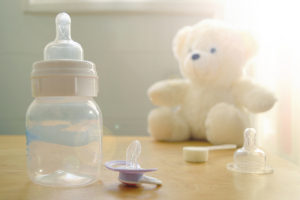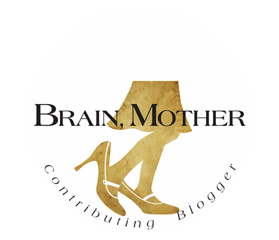Feeding a baby is a Herculean task. It takes a lot of time and a lot of effort and how we do it can be utterly defining of our early experience of motherhood. Breast, bottle, or perhaps a bit of both? A simple question, but as you know well if you have ever been privy to the dog-eat-dog world that is a birth-month forum, its answer can polarize people in a fairly shocking way.
There is no doubt anymore that from a health perspective ‘breast is best’ for both baby and mom. Immunologists, allergists, and nutritionists will chime in here about the amazing and incomparable properties of breastmilk - a living and ever-changing entity - that have its advocates referring to it as ‘liquid gold’. Psychologists will attest to the formidable bond between a breastfeeding mother and her child. The issue, rather, now stems from the fact that we have a choice to make. We live in a society where there is a viable alternative to breastmilk and a host of other goods vying for our attention: sleep, freedom, sanity to name just a few. Babies can and do thrive on a substance that doesn’t have to be eked out - in one way or another - from the already depleted body of a newly-minted mother. But as I write that sentence and as you read it, we can both tell there is a sense of compromise inherent. Even the packaging on formula itself bears witness: you can feed your kid what’s in the box, but only as a runner-up.
No overachieving parent likes the thought of starting their offspring out in life with the consolation prize. This explains the extraordinary lengths - and I know of astounding obstacles surmounted - many of us go to, especially with our first child/ren, to succeed at delivering the goods. It also explains the huge culture of guilt that has arisen around those of us who don’t. And when middle class mothers fail at things that are important, we need excuses or, at any rate, reasons.
So what is the reason that so many women fail at breastfeeding? I have been accused fairly recently (and pre-twins) by a very good friend of being ‘militant’ that mothers should choose to breastfeed. This is not true. What I am militant about, I had to correct her, is the misinformation and myth surrounding the enterprise. Her comment was in response to my disgruntlement at a picture of a friend, a friend who had said she wanted to give it the old college try, feeding her baby a bottle on what looked like day three of its life. Of course there is no crime in feeding your three-day old a bottle of formula, but this is not to say that doing so won’t sound the death knell for your chance at a sustainable breastfeeding relationship. Okay, okay that sounds extreme. But I would love to know the statistic of how many women go on to successfully breastfeed after supplementing from such an early age.
The issue is this. While the concept that breastfeeding works on a supply and demand basis is, in the abstract, easy to accept, less so is what this means day in and day out. Because what it means is that it is you who needs to build your supply to meet your baby’s demand - not your husband, not your mother-in-law, and not your baby nurse - and you need to do so every single time. In the first few weeks, there really is no way around it. I have heard, and been told of, many, many women who report that they couldn’t breastfeed because they ‘didn’t have enough milk’. This has become somewhat of a mantra. In reality, however, only about 1% of women actually can’t, from a physiological perspective, produce the requisite amount to feed a baby exclusively. Math isn’t my strong suit, but I’m pretty sure that means 99% of us can.
And herein lies the difference between a woman’s ability to have enough milk versus a woman’s ability to make enough milk. Sure, you might not have enough milk at a given time to feed your baby, but can you make enough? For 99% of us, the answer is yes. I won’t mention here the women who have enough milk to feed two - and even three - babies at the same time; the women who only have one functioning breast and have enough milk to feed their babies; the women in third world countries who don’t have recourse to formula and bottles and who have to have enough milk, despite their own poor living conditions, to feed their babies.
The more pointed question then becomes: why don’t some women make enough milk? Well, because it’s bloody hard work. For starters, it hurts. It’s touted as the most natural thing in the world, but let’s be honest: nothing, and I mean nothing (unless you are into a little S&M), can prepare you for the sensation of a tiny, unexperienced, and often misguided mouth clamping onto your boob. I think it is safe to say that for the vast majority of us we are entering unwanted territory when the words ‘blood’ and ‘nipple’ can be used in the same sentence. Midwives and lactation consultants will tell you until the cows come home that it only hurts when you are doing it wrong but this is, quite frankly, bullshit. Ultimately, yes: things become much more comfortable the more established you get. But it is patently false that you won’t experience pain - and of a toe-curling variety - in the beginning stages of breastfeeding, even if you are doing it just perfectly.
And it’s not just hard from a mechanical point of view. The incessant and exclusive nature of the endeavor is exhausting, physically and emotionally. The virtues of the bottle are crystal clear in this respect, so much so that even the most attachment-oriented mom would have to be blind not to see them. I often think, in a whimsical, fairytale-esque sort way, about what it must be like to recover from birth without having to wake up and feed the baby, over and over again. It is perhaps the cruelest feature of the reality of breastfeeding that after nine months of carrying the baby (and the travails that come with it), plus the ordeal of delivering the baby (and the travails that come with it), a breastfeeding mother must be subjected to yet more pain, yet more sleep deprivation, and yet more responsibility. But, alas, there it is.
The flipside of the story is that breastfeeding too is not without cost and we women who do it, like our formula-feeding counterparts, need to accept the consequences of our decision. Many a breastfeeding mother will tell you, with an air of pride bordering on smugness, that her baby won’t take a bottle, that he has never, not ever, had formula, not even a single drop. And in the next breath, complain about being at her wit’s end because she is constantly on call. This is a pet peeve of mine. In recent years I have begun to articulate as much in some of the maternal circles I frequent in a way that has been met with suspicion. I have even been accused, among the otherwise harmless banter of my bookclub no less, of ‘having a penis’ because I voiced the opinion that women shouldn’t moan about their husbands not getting up at night, when they have chosen (with uncompromising fervor) to be the sole source of their baby’s nutrition. For better or for worse, breastfeeding tends not to lend itself to a middle ground. And while we often relish being irreplaceable to our baby, it is not to say there aren’t options other than the slog of exclusive, ‘demand’ feeding (more on this later).
As strange as it might sound, the crux of the breast versus bottle debate is honesty. I’ll practice what I preach by admitting that I chose not to exclusively breastfeed my twins. It wasn’t that I didn’t have enough milk (I did); it wasn’t that they couldn’t latch (they could); and it wasn’t because I was stricken by the usual suspects of physical grievance (though I was). The real reason was that the price, cashed out in terms of time spent with my other children and my overall well-being, was simply too high to pay. Do I feel guilty about it? You bet. Do I think it was the right decision? You bet. There is no paradox here. With breastfeeding, as with most important decisions, there are trade-offs either way you go. If you do breastfeed, do it with pride, but know - and accept - that the exclusive nature of the undertaking is bound to have consequences for your freedom (and perhaps your other relationships). If you don’t - and there are many reasons why you might not want to - be honest about what those reasons are. It can make a big difference to the next mother-to-be in the queue and to the cause in general.
Like this:
Like Loading...


